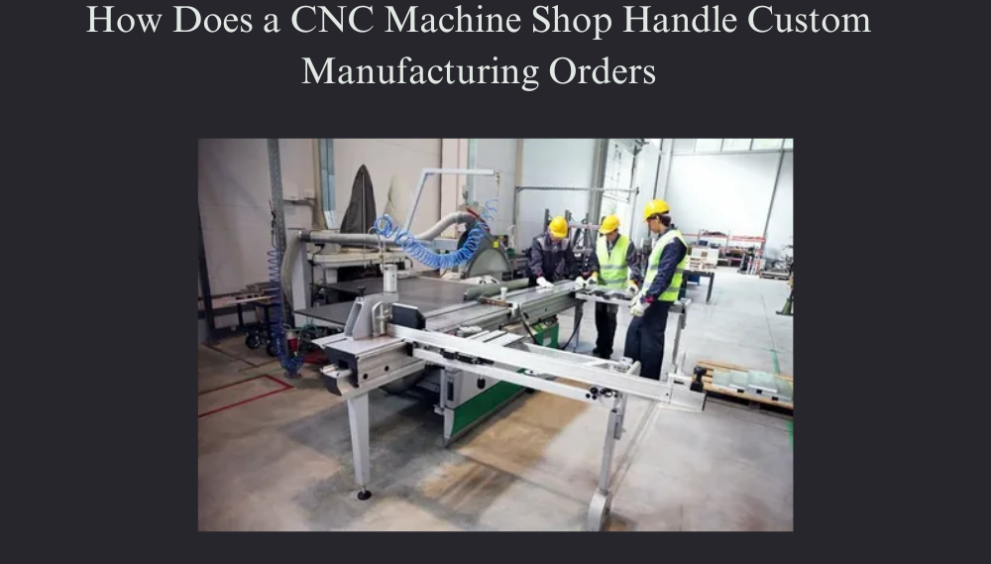How Does a CNC Machine Shop Handle Custom Manufacturing Orders


CNC machine shops play a vital role in modern manufacturing by offering precision and efficiency. However, when it comes to custom manufacturing orders, CNC machine shops need to handle these requests with extra care and detail. This blog will walk you through the process a CNC machine shop follows to handle custom manufacturing orders, from understanding the client’s needs to delivering the finished product.
Note : Partner with our CNC machine shop for high-quality, custom manufacturing solutions tailored to your exact needs. Whether you’re working on a small project or a large-scale production, we deliver parts with accuracy and reliability. Contact us today to discuss your custom order and see how our CNC machining can bring your ideas to life!
Let’s dive into the steps!
1. Understanding the Client’s Needs
Before any manufacturing begins, the first and most important step is understanding what the customer wants. Custom orders often come with specific requirements that may not be standard.
a) Detailed Consultation
When a client approaches a CNC machine shop with a custom order, a detailed consultation happens. During this meeting, the client explains what they need. They may bring sketches, blueprints, or even physical samples to help explain their vision.
b) Asking the Right Questions
The CNC machine shop will ask important questions to make sure they fully understand the order. Some of the questions might include:
- What materials do you want to use?
- What are the size and dimensions of the part?
- How many units do you need?
- What is the deadline for the project?
By asking these questions, the CNC shop can get a clear picture of the job and ensure they meet the customer’s expectations.
2. Reviewing the Design Specifications
Once the customer’s needs are understood, the CNC machine shop moves to the next step: reviewing the design specifications.
a) Working with CAD (Computer-Aided Design)
Many custom manufacturing orders come with designs in digital form. The most common format is a CAD file. These files contain detailed instructions about the shape, size, and features of the part. CNC machine shops use CAD software to examine the design closely.
b) Offering Design Advice
Sometimes, a customer’s design might need small changes to make it easier to manufacture. As a result, CNC machine shops often provide feedback and suggestions on how to adjust the design without compromising the final product. For example, this could include recommending different materials or even changing some dimensions to improve manufacturing efficiency
3. Choosing the Right Materials
Choosing the correct material for a custom order is crucial. The material determines the durability, strength, and overall quality of the final product.
a) Common Materials Used in CNC Manufacturing
CNC machine shops can work with a wide range of materials. Some of the most common ones include:
- Metals: Aluminum, steel, titanium, and copper.
- Plastics: ABS, PVC, nylon, and polycarbonate.
- Wood: Some CNC shops also work with wood for specific projects.
b) Matching Material to the Job
The CNC machine shop helps the customer choose the best material for their project. For example, if the part will be exposed to heat or pressure, the shop may recommend using a heat-resistant material On the other hand, if the part needs to be lightweight, plastic or aluminum might be better options.
4. Creating a Prototype
After finalizing the design and selecting the material, the CNC machine shop often creates a prototype. A prototype is a sample part made before full production begins. This step ensures that everything is perfect before making a large quantity.
a) Importance of Prototyping
Prototyping allows the customer to see the part in real life. They can check its size, fit, and functionality. If any issues arise during this phase, changes can still be made to the design before mass production starts.
b) CNC Machines Used in Prototyping
During prototyping, CNC machines like mills, lathes, and routers are used to cut and shape the material. The prototype is then thoroughly inspected to ensure it meets the exact specifications of the custom order.
5. Preparing the CNC Machines for Production
Once the prototype is approved, it’s time to prepare the CNC machines for full production.
a) Programming the Machines
CNC machines are controlled by computers. These computers need to be programmed with the exact instructions on how to cut, drill, or shape the material. This process is known as CAM (Computer-Aided Manufacturing). The shop uses CAM software to turn the design into a set of commands that the CNC machine can follow.
b) Setting Up the Machines
After programming, the CNC machine must be set up correctly. This involves securing the material in place and adjusting the tools to ensure precise cutting and shaping. The machine operators double-check everything to prevent any mistakes during production.
6. The Manufacturing Process
With the machines programmed and set up, the actual manufacturing process begins. CNC machines work automatically, following the instructions they were given.
a) Precision and Speed
CNC machines are known for their precision and speed. They can cut, shape, and drill materials with extreme accuracy, down to fractions of a millimeter. This makes them perfect for custom orders that require high levels of detail.
b) Continuous Monitoring
Even though the machines are automated, skilled technicians closely monitor the process. They ensure the machines work correctly and the parts produced meet the required standard. If any issues arise, they can stop the machine and fix the problem before it affects the entire batch.
7. Quality Control
After the parts are manufactured, the CNC machine shop performs thorough quality checks to ensure that every piece meets the customer’s specifications.
a) Inspecting for Defects
Each part is carefully inspected for any defects. This includes checking for cracks, rough edges, or incorrect measurements. High-quality parts should be flawless, with no visible issues.
b) Using Measuring Tools
To ensure precision, the CNC machine shop uses advanced measuring tools like calipers and micrometers. These tools measure the dimensions of the parts to make sure they match the original design.
8. Finishing the Parts
Once the parts pass quality control, the next step is finishing. Finishing refers to any additional steps taken to improve the look or durability of the part.
a) Common Finishing Processes
There are several finishing processes that a CNC machine shop might offer, including:
- Polishing: To give the part a smooth, shiny surface.
- Coating: To protect the part from rust or corrosion.
- Engraving: For custom markings or logos.
b) Customizing the Finish
For custom orders, the client might have specific requests for how they want the part to look. The CNC machine shop can accommodate these requests, ensuring the final product looks exactly as the customer wants.
9. Packaging and Shipping
After the parts are finished, the CNC machine shop prepares them for delivery to the customer.
a) Safe Packaging
Custom parts are often delicate, so they need to be packed carefully to avoid damage during shipping. The shop uses protective materials like foam, bubble wrap, or cardboard to keep the parts safe.
b) Arranging Shipping
CNC machine shops work with reliable shipping companies to ensure timely delivery. For large or bulky orders, the shop may also offer special handling services.
10. Communicating with the Customer
Good communication is essential throughout the entire process. From the moment the customer places their order to the delivery of the finished parts, the CNC machine shop keeps the client updated.
a) Regular Updates
The CNC machine shop provides regular updates on the progress of the order. This might include:
- Confirmation of the design and materials.
- Updates on the production timeline.
- Notification when the parts are ready to ship.
b) Addressing Concerns
If the customer has any questions or concerns, the CNC machine shop is there to help. Clear communication ensures that both the customer and the shop are on the same page.
Conclusion: A Smooth and Efficient Process
Handling custom manufacturing orders in a CNC machine shop involves several steps. First, it starts with understanding the client’s needs, and then progresses to delivering the final product. At each stage, every step is carefully managed to ensure that the parts are made with precision and meet the customer’s exact specifications. Moreover, CNC machine shops are well-equipped to handle custom orders, thanks to their advanced technology, skilled technicians, and strong commitment to quality. With clear communication and by paying close attention to detail, they can consistently deliver high-quality, custom-made parts on time
If you have a custom manufacturing order, partnering with a reliable CNC machine shop ensures you get the exact product you need, made to your specifications, and delivered on time.
For more insightful articles related to this topic, feel free to visit bloggingshub.com













